While FINAL FANTASY didn’t invent the classic turn-based RPG (that honor goes to DRAGON QUEST), the series stands out for constantly reinventing itself and blurring genre tropes with each mainline iteration. While the Dragon Quest series is comfortable, cozy, and familiar, the Final Fantasy series is about taking big swings, changing foundational mechanics and reworking its own lore with each new entry. They’re not always home runs, but they’re always at least a new way of experiencing something familiar and beloved. FINAL FANTASY XVI in some ways is both another pivot for the franchise, and a retread of very familiar territory; it turns the classic RPG franchise into a medieval character-action game and—with a few notable bumps in the road—makes the series lore feel fresh, bold, and a whole lot of fun to play.
The way the Final Fantasy series has been able to explore so many different genres and styles has always kept me interested throughout its almost 40 year long history. Every game is a totally new adventure, a new cast, a new world, but revolving around similar themes and lore connected to magic and crystals. Although I haven’t beaten all of them, I have always been incredibly curious about each direction the different games take the franchise. FINAL FANTASY XVI is one of the most dramatic changes in many ways. It moves the mainline series back to its medieval, high fantasy roots, but filtered through a gritty and angsty lens. The main character Clive swears like a sailor while getting beaten to a pulp, characters dismember each other, and fuck each other. It’s definitely new territory for the franchise, characters and storylines used to be full of fanservice and violence, but it was always playful. This is taking itself seriously. The creators have referenced GAME OF THRONES as an inspiration for this new tone entry, but unfortunately it ends up feeling less like prestige television and more like CW schlock—things just happen, plot points are introduced and then forgotten about, and the character are ready to fight and fuck at a moments notice.
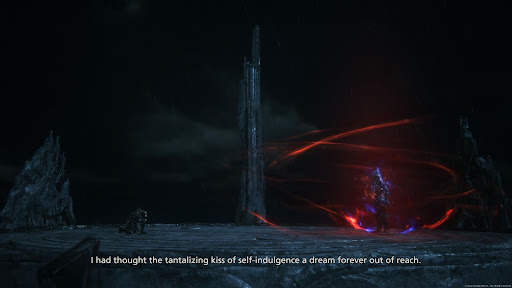
Like truly what does this even mean.
This isn’t necessarily a complaint—I can really enjoy schlock. But the self seriousness of the narrative makes it hard to tell if i’m laughing with it, or at it. It’s ultimately a story about Clive saving the world through the power of friendship, and while this is classic fantasy RPG nonsense FINAL FANTASY XVI tries to complicate things through convoluted narratives about destroying magic crystals to stop global warming, while helping out territories caught between warring nations states. It’s also, somehow, a love story? The most interesting thing is how the game builds out the idea of summons and how specific characters can “awaken” as “dominants” and be carriers of these otherworldly beings. Unfortunately, much like everything else in this game, what it means to be a dominant isn’t engaged with super deeply. You’re told multiple times that it means something, but they are essentially just powerful people. Their treatment throughout the narrative isn’t always consistent; some are revered, some work for other people, some are kings, some are slaves. It’s odd, but interesting, much like everything else in FINAL FANTASY XVI. There can be really strong moments in the overall narrative, but they’re never consistent, and those points usually end up being the smaller character interactions.
Clive is a wonderful protagonist. He has a sort of doe-eyed, himbo vibe that’s refreshing for the series after a long line of mostly downer protagonists (Cloud, Squall, Lighting, Noctis). He’s also not a happy-go-lucky, “woohoo adventure” hero who has to make a joke every second like some of the other ones (Zidane, Titus, Vaan). Obviously, I’m summarizing, and I have a soft spot for all of these heroes, but Clive really does feel like a breath of fresh air. There are moments in the story where he feels doubtful, questioning his purpose, his sense of self, but this is never used to mistreat or ostracize the cast. He’s not afraid to show his emotions and relies on the people around him to find his purpose and get through things. Cid, Jill and Joshua are the other main stars of the game, but they don’t get nearly enough narrative meat to really connect for me. Yeah, I feel bad for Jill being a prisoner of war most of her life, but that hardly gets any sort of quality engagement. The relationship between Clive and Jill is sweet, but a bit undercooked because there is so much going on. Joshua and Cid also have their own arcs but it’s all in service of propelling Clive forward on his grand adventure in ways that sort of undermines the importance of the party that’s been more present in other Final Fantasy games. I can see all of the ideas in the game being interesting narratives to explore through the franchise, but unfortunately none of them feel fully invested in so they can shine.
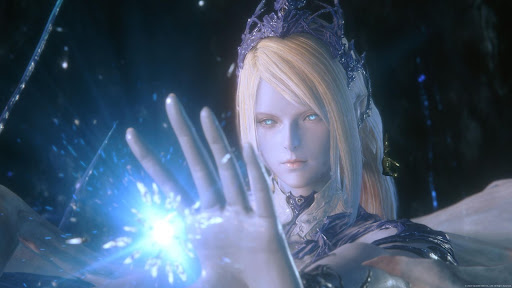
The designs of the summons are all solid this go-around.
The summons’ use as a narrative tool may ultimately fall flat, but mechanically they’re sick as fuck. FINAL FANTASY XVI’s marketing was built around the summons. While they have always played an important role in shaping the tone of a game. Take Shiva for example. She’s been a motorcycle (FINAL FANTASY XII), she’s had big dreads (FINAL FANTASY X), she’s been just a gray woman with huge boobs (FINAL FANTASY XV). Every entry reinterprets the summon designs offering another thing to look forward to. So while the XVI may be making a dramatic change aesthetically, the summons and watching them fight was a great way of anchoring this new turn in a familiar and important aspect of the franchise.
Getting a game where summons would not only be a bigger part of the main story, but would be integral to the gameplay mechanics was exciting. Here they’re known as Eikon, (not Espers [V] or Aeons [XI] or Eidolons [IX] or Guardian Forces [VIII] or Primals [XIV]). Fighting other dominants was always really cool and reminiscent of the classic rival fights against Virgil (DEVIL MAY CRY 3) or Jeanne (BAYONETTA). One-on-one encounters with someone who has access to similar powers as you is always a great skill check. They’re flashy, fast, fun, and the constant banter between Clive and the other dominants is entertaining. The Eikon fights on the other hand are always impressive visually, but unfortunately a lot of the combat is reduced to cutscenes and Quick Time Events. The actual fighting that the player does is relegated to either an on-rails shooter, or a simplified version of the non-Eikon combat system. It’s fun to suddenly be fighting as a giant Ifrit, but it just ends up feeling more button-mashy and repetitive.
While this isn’t the first time summons have been integral to the gameplay (I’m thinking of VIII’s 8s Junction system), it is the first time that they have taken up so much visual space in the combat. Think of them like weapons in DEVIL MAY CRY 3, where the weapons are unlocked by defeating a boss and have a similar moveset and feel. Garuda does swift moves and can pull enemies closer to you. Titan allows you to parry and pummel your foes with a perfectly timed block. Ramuh is great for crowd control, providing a way to chain lighting between enemies so that they all take damage whenever one of them is hit. These aren’t even half of the summons, and every new unlockable Eikon was exciting and fundamentally changed the ways I engaged with combat. Switching Garuda out for Shiva made me zoom after the enemies as opposed to bringing them to me. Switching out Titan for Bahamut offered a longer range moveset that relied on distance to charge attacks as opposed to waiting to parry. Eventually you can mix and match skills between Eikons, so if you want to use a Garuda skill but also have Titan’s parry ability at the same time, you can do that. The fighting never got old, it’s always flashy and feels so satisfying to pull off a combo while switching between summons. There are nods to DEVIL MAY CRY and BAYONETTA that feel so on the nose that it has to be intentional, and it really did seem like I was playing something as mechanically dense and fun as those iconic genre games. The combat is so fluid, snappy, quick; it’s shocking how seamless this world could pivot to a character action game.
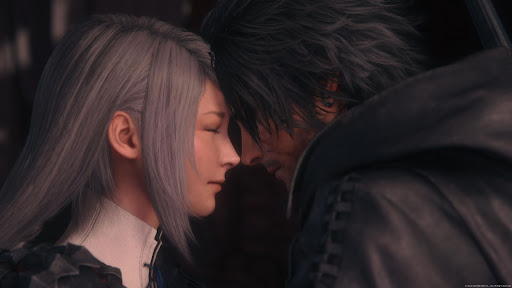
They’re no Squall and Rinoa, but I’m a sucker for all the cliche love stories in these games.
The mainline Final Fantasy series has been slowly moving into this more action focused genre, and by slowly, I mean very very slowly. It started with the ATB bar (Active Time Battles), which essentially just meant you had to watch the screen and pay more attention to when you could act. That carried the franchise roughly from IV to IX, with FINAL FANTASY X switching to a speed-state based mechanic, where your character’s speed determined when their turn was. It was XII where they really tried to make it more of an active process through their ADB system (Active Dimension Battle). There were no longer random encounters and battles took place in the same environments you were exploring. Essentially you were setting up scenarios for your characters to react to, meaning that you as a player mostly watched battles play out with predetermined reactions. You can have your healer cast cura if any of your team members go under 30 percent health, or you can have your magic character cast Firaga but only to enemies weak against fire. In this way, the player spent most of the time setting up if/then systems in a menu, and then let the battles play out, making tweaks when the formulas were not applicable. FFXIII switched back to a new system with multiple ATB bars, meaning you can stock up turns to deal out combos of attacks. FF: LIGHTNING’S RETURN was when the franchise officially moved to a single controllable character, and then FFXV is where the game really pivoted to a faux-action genre. Known as the “Active X Battle” system, XV did away with any sort of turn order or ATB Gauge. You could spam attacks and dodgeding was an integral part of survival. You were still reliant on magic and buffs, but it was clear that the mainline series was done with waiting around to attack.
FINAL FANTASY XVI feels like it’s finally throwing off these classical expectations placed on it, moving entirely into character action, and leaving behind more of its RPG elements. Elemental weaknesses are not a thing here, and you are only concerned with three pieces of equipment and two accessories that don’t really make a huge noticeable difference to your play. There were moments where I caught myself thinking about how dramatic of a change this is, not because of how action-oriented it is, but because of the fact that the combat is actually one of my favorite parts of the game. I never really enjoyed the combat of the newer Final Fantasy games because they felt limited by their RPG mechanics. While I love a 100+ turn-based RPG, the awkward in-between battles systems that the series has been attempting never really hit. Moving would feel clunky or the systems were not as well thought out, you could easily spam or brute force battles in those recent games. Suddenly I’m playing a mainline game in the franchise where the combat feels incredibly exciting and rewarding, where I feel like I am playing the way it was intended to be played and it’s clicking. It feels like this was the game that the team had been trying to make for a while, and has finally been able to do it by slowly building up to it through previous imperfect attempts.
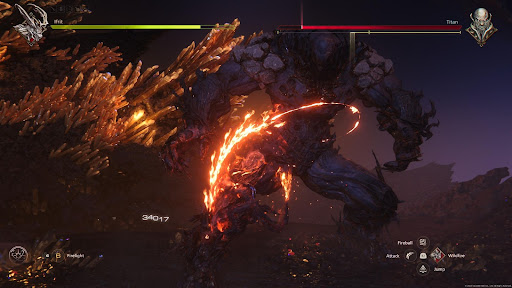
These fights always start off strong, then slowly end up staying too long.
FINAL FANTASY XVI may seem like a radical new direction, but to me it feels like a culmination of a lot of the different ongoing interests the mainline franchise has always been invested in. With all the expanded universe of Square Enix RPGs (BRAVELY DEFAULT, OCTOPATH TRAVELER, and WORLD OF FINAL FANTASY just to name a few) there is no shortage of turn-based combat games coming out. Mainline Final Fantasy games have actively been trying to shed their turn-based identity as far back as FFIV. There’s still the heightened melodrama, the backdrop of war, the classic naming conventions, and ultimately the fight against a God through the power of friendship. While the story may not be the strongest, the way XVI uses the franchise’s key aspects are refreshing. Whereas the previous games have slowly been trying to tip toe away from their more classic RPG mechanics, XVI is a stomp in the ground, a distinct point in the series taking the leap more dramatically into a new genre, and sticking the landing.


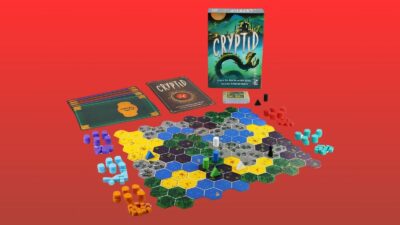

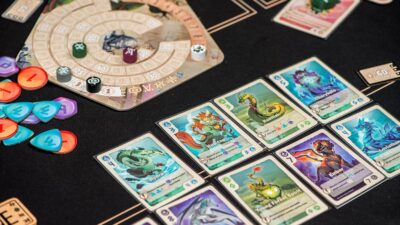
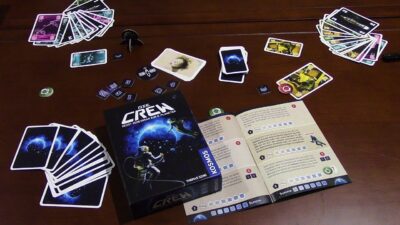
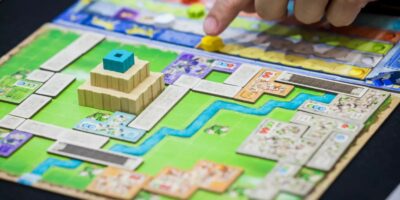

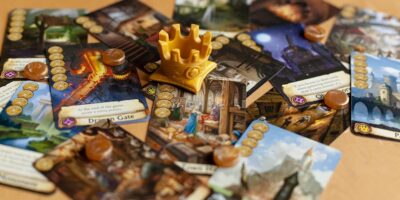


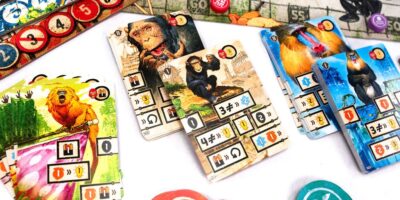




Comments